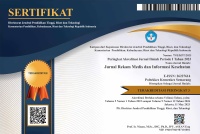Scoping Review: Intervensi Penyakit Tidak Menular Menggunakan Media Digital Promosi Kesehatan dalam Proses Pencegahan Primer
Abstract
Every year, 17 million people die from NCDs before the age of 70; 86% of these premature deaths occur in low- and middle-income countries. Changes in digital media are taking place so fast that health education in health counseling must need to be updated by doing a new innovation so that it can create a health promotion media product that can be consumed by the public easily. Objective: to map the literature on a particular topic or research and provide an opportunity to identify key concepts, gaps in research, and for policy making. Methods: the process of finding relevant reviews we used literature sources obtained through searches using PubMed, Scopus, Sciencedirect and Google Scholar databases and Global Health. Results: We reviewed 1165 studies from 10 databases, the results of the review we got 780 studies after that we filtered and got 491 full text articles, and the end of the full text filter we got 13 research articles in the inclusion category and will then be reviewed for the scoping review.
Keywords
Full Text:
PDF (Bahasa Indonesia)References
Ai Keow Lim. (2017). Virtualization of Health Care: The Role of Capacity Building. Springer Nature. https://link.springer.com/chapter/10.1007/978-3-319-47617-9_7#publish-with-us
Almomani, M. H., Rababa, M., Alzoubi, F., Alnuaimi, K., Alnatour, A., & Ali, R. A. (2021). Effects of a health education intervention on knowledge and attitudes towards chronic non-communicable diseases among undergraduate students in Jordan. Nursing Open, 8(1), 333–342. https://doi.org/10.1002/nop2.634
Castro, O., Mair, J. L., Salamanca-sanabria, A., & Alattas, A. (n.d.). Development of “ LvL UP ”, a smartphone -based , conversational agent- delivered holistic lifestyle intervention for the prevention of non-communicable diseases and common mental disorders.
Danielle Levac, H. C. & K. K. O. (2010). Scoping studies: advancing the methodology. Springer Nature, 5, 1–9. https://doi.org/https://doi.org/10.1186/1748-5908-5-69
Daudt, H. M. L., Van Mossel, C., & Scott, S. J. (2013). Enhancing the scoping study methodology: A large, inter-professional team’s experience with Arksey and O’Malley’s framework. BMC Medical Research Methodology, 13(1), 1–9. https://doi.org/10.1186/1471-2288-13-48
Dinkes Jateng. (2019). Profil Kesehatan Provinsi Jateng Tahun 2019. https://dinkesjatengprov.go.id/v201 8/storage/2020/09/Profil-Jateng- tahun-2019.pdf
Dorje, T., Zhao, G., Tso, K., Wang, J., Chen, Y., Tsokey, L., Tan, B. K., Scheer, A., Jacques, A., Li, Z., Wang, R., Chow, C. K., Ge, J., & Maiorana, A. (2019). Smartphone and social media-based cardiac rehabilitation and secondary prevention in China (SMART-CR/SP): a parallel-group, single-blind, randomised controlled trial. The Lancet Digital Health, 1(7), e363–e374. https://doi.org/10.1016/S2589-7500(19)30151-7
Ernest NJUKANG, N., Obinchemti EGBE, T., TENDONGFOR, N., YOAH, T. A., Emmanuel NJI, K., SAMA, M., Atabon AKO, F., & KAMGNO., J. (2022). Effect of mHealth on modifying behavioural risk-factors of hypertensive Disorders in Pregnancy in Mezam Division. Journal of Environmental Science and Public Health, 06(04), 314–321. https://doi.org/10.26502/jesph.96120176
Hilary Arksey & Lisa O’Malley. (2005). Scoping studies: towards a methodological framework. Taylor & Francis, 1(Research Methodology), 19–32. https://www.tandfonline.com/doi/abs/10.1080/1364557032000119616
James W, Elston D, T. J. et al. (20 C.E.). 済無No Title No Title No Title. Andrew’s Disease of the Skin Clinical Dermatology.
Jiang, Y., Liu, F., Guo, J., Sun, P., Chen, Z., Li, J., Cai, L., Zhao, H., Gao, P., Ding, Z., & Wu, X. (2020). Evaluating an intervention program using wechat for patients with chronic obstructive pulmonary disease: Randomized controlled trial. Journal of Medical Internet Research, 22(4), 1–18. https://doi.org/10.2196/17089
Kemenkes. (2018). Riskesdas. https://kesmas.kemkes.go.id/assets/upload/dir_519d41d8cd98f00/files/Hasil-riskesdas-2018_1274.pdf
Lairson, D. R., Chung, T. H., Huang, D., Stump, T. E., Monahan, P. O., Christy, S. M., Rawl, S. M., & Champion, V. L. (2020). Economic evaluation of tailored web versus tailored telephone-based interventions to increase colorectal cancer screening among women. Cancer Prevention Research, 13(3), 309–316. https://doi.org/10.1158/1940-6207.CAPR-19-0376
Orte, S., Migliorelli, C., Sistach-bosch, L., Gómez-martínez, M., & Boqué, N. (2023). Nutritional Behaviour Change. 1–17.
Rodrigues, D. L. G., Belber, G. S., Borysow, I. da C., Maeyama, M. A., & de Pinho, A. P. N. M. (2021). Description of e-health initiatives to reduce chronic non-communicable disease burden on Brazilian health system. International Journal of Environmental Research and Public Health, 18(19). https://doi.org/10.3390/ijerph181910218
Schoeppe, S., Alley, S., Van Lippevelde, W., Bray, N. A., Williams, S. L., Duncan, M. J., & Vandelanotte, C. (2016). Efficacy of interventions that use apps to improve diet, physical activity and sedentary behaviour: A systematic review. International Journal of Behavioral Nutrition and Physical Activity, 13(1). https://doi.org/10.1186/s12966-016-0454-y
Siegmund, L. A., Bena, J. F., & Morrison, S. L. (2023). Cardiac Rehabilitation Facebook Intervention: Feasibility Randomized Controlled Trial. JMIR Cardio, 7, 1–11. https://doi.org/10.2196/46828
Sillice, M. A., Jennings, E., Uebelacker, L. A., Abrantes, A. M., Holland, C. C., O’Keeffe, B., & Bock, B. C. (2019). African American women’s relationship with their mobile phone, and what they want in a mobile delivered physical activity intervention: guidance for intervention development. MHealth, 5, 1–11. https://doi.org/10.21037/mhealth.2019.05.01
Statista. (2016). Number of mobile phone users worldwide from 2015 to 2020. Statista Research Department. https://www.statista.com/statistics/274774/forecast-of-mobile-phone-users-worldwide/
Sumarsono, S., Sakkinah, I. S., Permanasari, A. E., & Pranggono, B. (2023). Development of a mobile health infrastructure for non-communicable diseases using design science research method: a case study. Journal of Ambient Intelligence and Humanized Computing, 14(9), 12563–12574. https://doi.org/10.1007/s12652-022-04322-w
Sy, A., Tannis, C., McIntosh, S., Demment, M., Tomeing, T., Marriott, J., Fukunaga, T., Buenconsejo-Lum, L., & Dye, T. (2020). An Assessment of E-health Resources and Readiness in the Republic of the Marshall Islands: Implications for Non-communicable Disease Intervention Development. Hawaii Journal of Health and Social Welfare, 79(6), 52–57.
WHO. (2023). Noncommunicable diseases (NCDs). Www.Who.Int. https://www.who.int/news-room/fact-sheets/detail/noncommunicable-diseases
DOI: https://doi.org/10.31983/jrmik.v7i1.11270
Article Metrics
Refbacks
- There are currently no refbacks.
Jurnal Rekam Medis dan Informasi Kesehatan (p-ISSN: 2622-1863 e-ISSN: 2622-7614), is published by Jurusan Rekam Medis dan Informasi Kesehatan, Politeknik Kesehatan Kemenkes Semarang, Jl. Tirto Agung, Pedalangan, Banyumanik, Semarang, Jawa Tengah 50268, Indonesia; Telp./Fax: (024)76479188 Public Services : e-mail: jurnalrmik2018@gmail.com
|
|---|




